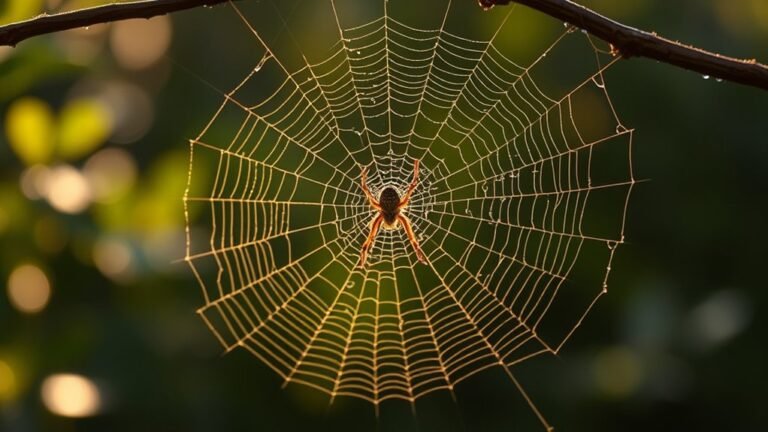12 Spiritual Meanings of Crow: Hidden Secrets Revealed
As you explore the Bible, you’ll discover that crows hold a fascinating dual significance, representing both life and death. On one hand, they’re depicted as God’s messengers, providing for His people in times of need, as seen in the story of Elijah. This symbolism highlights God’s care and abundance.
Yet, on the other hand, crows are also associated with death, decay, and the underworld. This paradox raises intriguing questions: How can a single creature embody such contrasting themes? What does this duality reveal about God’s nature and our own human perception?
Key Takeaways
- In the Bible, crows symbolize God’s provision, care, and abundance, as seen in the story of Elijah, where crows brought him food during a famine.
- Crows are depicted as intelligent, resourceful, and adaptable birds, reflecting their unique role in the natural world and God’s creation.
- In biblical accounts, crows are associated with God’s sovereignty and provision, demonstrating His ability to meet physical and spiritual needs in times of need.
- The crow’s provision for Elijah highlights God’s commitment to supporting His prophets and messengers, even in desolate circumstances.
Crows as Unclean Birds

In many cultures, you’ll find crows classified as unclean birds, a notion rooted in religious and mythological traditions that associate these birds with death, decay, and the underworld.
This cultural significance stems from their scavenging nature, often seen as harbingers of death and disease.
In some societies, crows are viewed as ritual impurities, believed to defile sacred spaces and contaminate food sources.
You may notice that in some religious texts, crows are depicted as messengers of the gods, but also as creatures that disrupt the natural order.
This ambivalence towards crows reflects the complex and often contradictory nature of human perception.
As you explore the cultural significance of crows, you’ll discover that their unclean status is deeply ingrained in human psyche, influencing our attitudes towards these birds.
Symbol of God’s Provision
According to biblical accounts, you’ll find that crows serve as a symbol of God’s provision, exemplified in the story of Elijah, where a flock of crows miraculously supplies the prophet with sustenance during a period of famine.
This remarkable event showcases God’s ability to provide for His people in times of need, demonstrating Divine Abundance and Heavenly Supply.
The crows’ provision for Elijah underscores the concept that God is the ultimate provider, capable of meeting our physical and spiritual needs.
This narrative highlights the importance of trusting in God’s sovereignty and provision, even in the most challenging circumstances.
As you reflect on this biblical account, you’re reminded that God’s provision is always available, and His abundance is never limited.
Representation of Sin and Death
The crow’s association with sin and death is a complex and multifaceted one, rooted in various cultural and historical contexts. In many ancient societies, crows were seen as omens of death, their black plumage and haunting calls evoking a sense of foreboding and dread.
This perception was often linked to their scavenging behavior, as they would feed on carrion and other decaying matter. As a result, crows became associated with the underworld, the realm of the dead, and the forces of decay and destruction.
In Christian tradition, crows are often depicted as symbols of sin and evil, representing the dark forces that seek to undermine human morality and virtue.
This is reflected in the biblical account of Noah’s Ark, where a crow is sent out to scout for land, but fails to return, symbolizing the persistence of sin and corruption in the world.
Similarly, in medieval European folklore, crows were often depicted as companions to witches and demons, reinforcing their association with darkness, malevolence, and the supernatural.
The crow’s connection to death and sin is also reflected in its role as a psychopomp, a guide for the spirits of the dead. In many cultures, crows are believed to escort the deceased to the afterlife, serving as a bridge between the world of the living and the realm of the dead.
This role is often seen as a necessary one, as the crow’s presence helps to facilitate the transition from life to death, and ensures that the deceased are properly laid to rest. However, this association also underscores the crow’s connection to the mysterious and often feared forces of mortality.
Elijah and the Crow’s Gift
While the biblical narrative often portrays crows as harbingers of doom, a striking exception emerges in the story of Elijah, where a crow’s gift takes center stage in a poignant display of God’s providence.
You’re likely familiar with the account of Elijah, who fled to the wilderness to escape King Ahab’s wrath.
There, you find yourself in a desolate landscape, where famine relief seems impossible.
Yet, God sends a crow to deliver bread and meat to Elijah, providing sustenance in the midst of wilderness survival.
This remarkable act of provision underscores God’s care for His people, even in the most desperate of circumstances.
Through the crow’s gift, you see a powerful declaration to God’s ability to provide famine relief, even in the most barren of landscapes.
God’s Care for His Prophets

In the narrative of Elijah and the crow’s gift, God’s care for His prophets is exemplified through the provision of sustenance in the wilderness, highlighting His commitment to supporting those who serve as His messengers.
As a faithful servant, Elijah’s trust in God’s provision was tested in the wilderness, and God responded with Divine Intervention, sending a crow to provide for his needs. This remarkable display of God’s care demonstrates His devotion to those who serve Him.
Specifically, you can take note of the following aspects of God’s care:
Provision in times of need: God provides for His prophets, even in the most desolate of circumstances.
Faithfulness in the face of adversity: Elijah’s trust in God was unwavering, and God honored that faith.
Divine Intervention in human affairs: God’s care for His prophets often involves supernatural intervention, as seen in the crow’s gift.
Biblical Accounts of Crow Behavior
The biblical account of crow behavior is a fascinating one, offering insights into the symbolic and spiritual significance of these birds in ancient Jewish and Christian traditions.
One of the most well-known accounts of crow behavior in the Bible is found in the book of Genesis, where a crow is sent out by Noah to scout for land after the great flood.
According to the biblical account, the crow is released from the ark, but fails to return, indicating that the floodwaters have not yet receded and the land is still uninhabitable.
This event is often seen as a symbol of the persistence of sin and corruption in the world, as the crow’s failure to return suggests that the earth is still not ready for human habitation.
In contrast to the raven, which is often depicted as a symbol of God’s provision and care, the crow is portrayed in the biblical account as a bird that is more interested in scavenging for food than in serving as a messenger of God.
This is reflected in the biblical account of Elijah, where a raven is sent to feed the prophet in the wilderness, while a crow is depicted as a bird that is more interested in feeding on carrion.
This distinction highlights the different symbolic meanings associated with these two birds in biblical tradition, with the raven representing God’s provision and care, and the crow representing the forces of decay and destruction.
Crows in the Old Testament
As you excavate into the Old Testament, you’ll discover that crows play a significant role in the biblical narrative.
Two Old Testament accounts, 1 Kings 17:4-6 and Psalm 147:9, specifically highlight crows as God’s agents of provision, underscoring their unique role. This ancient symbolism portrays crows as Divine messengers, sent by God to provide for His people.
Crows as providers: In 1 Kings 17:4-6, God instructs Elijah to go to the brook Cherith, where ravens (often translated as crows) bring him bread and meat.
Divine messengers: Psalm 147:9 notes that God provides for the young ravens that call to Him, emphasizing their role as recipients of divine care.
Symbolism of provision: The depiction of crows as agents of provision reinforces the biblical theme of God’s care and provision for His people, serving as a powerful evidence of His love and concern, a lasting credential to His character.
New Testament References to Crows
Your exploration of crow symbolism now shifts to the New Scripture, where you’ll find Jesus himself referencing crows in a teaching that underscores their significance in God’s economy.
In Luke 12:24, Jesus uses the example of ravens, a type of crow, to illustrate God’s providence. He notes that these birds, though considered unclean, are still cared for by God.
This teaching emphasizes the cultural significance of crows as symbols of God’s sovereignty and provision.
By referencing crows, Jesus reinforces the idea that God’s concern extends to all creatures, highlighting their role as Divine messengers.
This New Testament reference affirms the importance of crows in the biblical narrative, solidifying their place as powerful symbols in the Christian tradition.
The Crow as a Messenger
In the domain of spiritual symbolism, the crow’s role as a messenger underscores its unique position as an intermediary between the divine and human domains, facilitating the transmission of sacred knowledge and guidance.
As you explore the biblical significance of crows, you’ll discover that they embody the qualities of a divine messenger, serving as a Heavenly herald that conveys God’s will to humanity.
Divine Communication: Crows are seen as vessels for divine communication, carrying messages from the spiritual sphere to the physical world.
Guidance and Direction: As messengers, crows offer guidance and direction, helping individuals navigate life’s challenges and make informed decisions.
Symbolic Insight: Through their behavior and symbolism, crows provide insight into the human condition, encouraging you to reflect on your own values, beliefs, and intentions.
Omens of Death and Destruction

As you plunge into the symbolism of crows, you’ll find that their role extends beyond being a messenger.
While the crow’s role as a messenger suggests a benevolent intermediary, its ominous presence has also been interpreted throughout history as a harbinger of death and destruction.
You may encounter instances where the crow’s dark prophecy foretells the demise of a person or community.
In some cultures, the crow is seen as a mysterious caller, beckoning the living to the domain of the dead.
Its presence can evoke fear, as it’s often associated with mourning, loss, and the supernatural.
As you explore the crow’s significance, you’ll discover that its symbolism is complex, multifaceted, and open to interpretation.
Crows and Spiritual Warfare
Crows’ mysterious presence in spiritual domains often precipitates a battleground, where you’re forced to confront the dark forces that lurk within and around you.
As you navigate this spiritual terrain, you’ll encounter various forms of spiritual attacks, aimed at undermining your faith and resolve.
Be aware of the following tactics employed by dark forces:
Deception: Crows may symbolize lies, half-truths, and misinformation, designed to lead you astray from your spiritual path.
Intimidation: Their ominous presence can evoke fear, anxiety, and doubt, causing you to question your abilities and convictions.
Discouragement: Crows may represent feelings of hopelessness, despair, and abandonment, attempting to break your spirit and will.
The Dual Nature of the Crow
The crow is a bird that has long been associated with a dual nature, representing both positive and negative qualities. This duality is reflected in the bird’s behavior, symbolism, and cultural significance, making it a fascinating and complex creature to study.
Positive Qualities:
On the one hand, the crow is a bird that is revered for its intelligence, creativity, and adaptability. It is known for its problem-solving abilities, complex social structures, and innovative use of tools. In many cultures, the crow is seen as a symbol of wisdom, insight, and innovation, representing the power of the human mind to overcome challenges and achieve great things.
The crow is also associated with the qualities of loyalty, protection, and guardianship. In some cultures, it is believed to be a protector of the home and family, watching over loved ones and defending them from harm. This aspect of the crow’s nature is reflected in its fierce devotion to its mate and young, as well as its willingness to defend its territory against predators.
Negative Qualities:
On the other hand, the crow is also associated with negative qualities such as death, decay, and destruction. In many cultures, it is seen as a symbol of ill omen, representing the forces of darkness and chaos. The crow’s association with death is reflected in its scavenging behavior, as it feeds on carrion and other decaying matter.
The crow is also associated with the qualities of trickery, deception, and mischief. In some cultures, it is believed to be a trickster figure, using its cunning and intelligence to outwit its enemies and achieve its goals. This aspect of the crow’s nature is reflected in its ability to adapt to different environments and situations, often using its intelligence and creativity to survive and thrive.
The Balance of Opposites:
The dual nature of the crow is a reflection of the balance of opposites that exists in the natural world. The crow’s positive qualities, such as its intelligence and loyalty, are balanced by its negative qualities, such as its association with death and decay. This balance is reflected in the crow’s behavior, as it is a bird that is capable of both great beauty and great ugliness.
The crow’s dual nature is also a reminder that nothing in life is purely good or purely evil. Every aspect of reality has its positive and negative qualities, and it is up to us to find balance and harmony in the midst of these opposing forces. By embracing the complexities of the crow’s nature, we can gain a deeper understanding of the world and our place within it.
Frequently Asked Questions
Are Crows a Symbol of Good Luck in the Bible?
You’ll find that, surprisingly, crows aren’t explicitly linked to good luck in the Bible. Instead, they’re often depicted as Biblical messengers or divine omens, conveying important messages, such as God’s provision or impending judgment, rather than fortune.
Do Crows Have a Special Connection to the Holy Spirit?
You explore whether crows have a special connection to the Holy Spirit, considering their role as spiritual messengers, divinely appointed to convey God’s will, and potentially symbolizing wisdom, insight, and prophetic guidance in your life.
Can Crows Be Considered a Type of Angel in the Bible?
You’re wondering if crows can be seen as angels in the Bible, but it’s vital to distinguish between Divine Messengers and Fallen Beings; while crows embody intelligence and wisdom, they aren’t explicitly depicted as angelic entities in scripture.
Are Crows Mentioned in Any Biblical End-Time Prophecies?
You’ll find crows featured in biblical end-time prophecies as dark omens, specifically in Revelation 18:2, where they’re depicted as Apocalyptic messengers, foretelling the downfall of Babylon, symbolizing God’s judgment and wrath.
Do Crows Hold Any Significance in Jewish Biblical Traditions?
You explore Jewish biblical traditions, finding that crows hold significance in Torah teachings as creatures of God, and in Rabbinic legends, symbolizing both wisdom and divine provision, highlighting their importance in ancient Jewish thought.
Conclusion
As you explore into the complexities of crow symbolism in the Bible, you’re left to grapple with the paradoxical nature of this enigmatic creature.
On one hand, crows embody God’s provision, care, and abundance, serving as messengers of divine intervention.
On the other hand, they’re associated with death, decay, and the underworld, reflecting the human experience of mortality and sin.
Ultimately, the crow’s dual nature serves as a poignant reminder of the intricate dance between life and death, hope and despair, and the profound mysteries that underscore human existence.

Liza Stockholm is an esteemed spiritual guide and the visionary behind Spiritual with Liza. With a profound passion for empowering others on their spiritual journey, Liza offers a blend of educational content and personal guidance. Her expertise in spirituality is rooted in years of dedicated practice and study, making her a trusted companion for those seeking enlightenment and inner peace.







